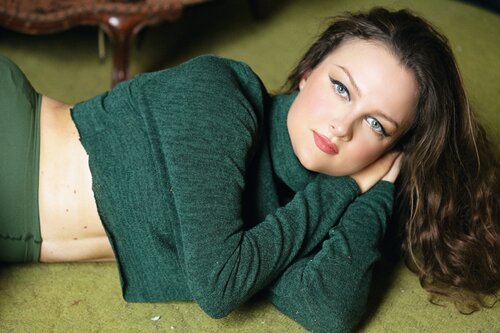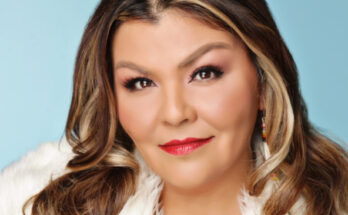Ashley Ray was standing in her bra, pink curlers in her hair, a smoke fired up in her right hand, on center-stage at the Grand Ole Opry.
Well, Ashley, a 5-foot-4 woman who describes herself as “Kansas-grown,” wasn’t really in underwear and curlers when standing in front of the WSM microphone on country music’s most-hallowed stage.
But the woman who had dressed like that — the grandmother who colored Ashley’s life and lends her name to the title and the proud, raw spirit of Ashley’s new album, Pauline — was there, in the singer-songwriter’s mind’s eye, as she delighted the Opry.
Ashley really does wear that empowered and alluring garb – a bra and curlers, like the woman she’s channeling — on the album cover.
Their names may differ, but Ashley (Pauline) Ray and her mom share Pauline’s bloodline, blue-collar spirit and work ethic.
“My grandmother was Pauline, and my mother is Pauline, and I’m Pauline,” Ashley explains. She shares the other women’s spirits while exposing her own on the album, on which she details her life in a steely voice that betrays hints of heartache and injury.
“My grandmother, Pauline, and my mom, I got both their legs,” says Ashley, who at 36 finally is riding those legs to what should be long-delayed success. “I happen to like my legs,” she says, looking down and smiling, admitting she’s wearing “my mom’s Levi’s.”

On this hot East Nashville afternoon, her dog Seger has climbed over those legs and into her lap, nestling against her flannel shirt, as he seeks refuge from the lawnmowing crew outside. “He doesn’t like the lawnmower, but the Weed Eater man he really doesn’t like,” Ashley says, stroking her “fur child” while offering soft reassurance: “Hey, boo-boo. It’s OK.”
The dog is named for the singer, Bob Seger, whose “Turn the Page” is the anthem she and her sister Kelsie learned while hanging out with father, Rick, a heavy equipment operator who died at 48 in a fall on the family farm outside Lawrence, Kansas.
“He’s the voice of my childhood,” she says of Seger, the blue-collar, Midwestern, boomer-era rock star. “I can hear his voice and be anywhere and be instantly transported back to Kansas.”
Dad Rick played Seger on the pickup radio and on tapes, and surely it was a constant on the jukebox when he and his elder daughter went out for refreshments.
“I was a country girl,” says Ashley. “I love it when my friends call me ‘Dive Bar Darling,’ because I grew up drinking Shirley Temples with my dad in dive bars and the VFWs. … I cut my teeth as a performer in dive bars.”
As the conversation lilts in the 600-square-foot house, Seger settles down after the mowing crew departs.
Ashley gazes out the back window to the crisply cut yard, where she has a table and a small firepit. A well-occupied clothesline is more warm-hearted channeling of grandma, Pauline, and mom, Teri.
“I’m starting to use a clothesline again,” explains Ashley. “I’m excited by it. It makes me feel nostalgic. If I’m going to hang ‘em on hangers anyway, might as well be out in the beautiful sun.”
Drying clothes in the wind and sun is a connection to life learned and lived on her family’s 99 acres of the Great Prairie. The quilt, sundresses and other items blowing in the breeze pay unconscious homage to the life of the grandmother who flavors her soul.
Seger – a 38-pound, brown-with-black-ears “shepherd and some kind of little dog mix” – sleeps soundly as Ashley continues to talk about that pre-COVID Opry performance, during which she was able to reveal in song some of the scars, drunk or sober, plenty of the hurts and a lot of the vulnerable passion and pride she has transported from the prairie and into her life in Nashville.
“I got to sing these songs about my family,” she says, pushing back a strand of what she describes as “dishwater-brown hair’’ while drawing a long, cool breath.
“I could cry thinking about it,” she continues, almost-tears pooling in bright, farm-country-blue eyes. “I got to stand there and sing; and my grandfather (‘Popo’), mom and sister were there on the side of the stage with me while I did it.” Pauline, who died December 28, 1980, was there in spirit and stories told.
Ashley’s only armor while revealing herself to the crowd was her dad’s handkerchief, wrapped around her right wrist.
“I wouldn’t have wanted that to happen to me any time sooner. That was my break.”
That wait, she’s 36 and began chasing her musical dreams as a Belmont freshman all those years ago, and all the mind-dulling labor, solace in a bottle and personal struggles she’s navigated have mostly been worth it to her.
“I had to go through all those years of ‘Nos’ and ‘almosts’ to really write this record, and be grateful for this journey,” she says, adding that “Pauline,” whether it sells in the hundreds or hundreds of thousands, really is her big break from those years of having her dreams figuratively kicked in the teeth.
“I needed the rejection,” she says. And she got plenty while working as a staff writer or while swamping tables at restaurants and saloons. Even while exercising love and lust.
That rejection and hoped-for-subsequent triumph ties this album together:
I paint my smile in the mirror when the real one’s gone,
This ain’t the kinda show that I thought I’d put on
Wiping tables when I should be singing songs …
Thank God I didn’t know at 22
How goddamn long a dream takes to come true…
That’s just a sample from the song “Waiting,” named for the period of time it took her to chase her dreams and all the smiling, swaying-hips-for-tips restaurant work that supplemented her writer’s pay, so she could cover her bills.
This album was birthed when she sent a fragment of the song “Rock ‘n’ Roll” – Mama’s smokin’ in the kitchen playing solitaire; she been burnin’ them packs with a monkey on her back since Daddy ain’t there; She been swinging that ax and picking up the slack and it ain’t fair …. So I could sell my soul to rock ‘n’ roll — to her writing partner Sean McConnell.
“I sent it to Sean, thinking ‘THIS IS SOMETHING.’ And he said ‘Ashley, this is the beginning of a reckoning, of you explaining who you are,’” says the former waitress, who harvested lyrics in her head while she was mopping floors and serving beers and burgers.
With McConnell’s writing help (and with Natalie Hemby on “Just a House”), she wrote about her life, from its Midwestern beginnings to whiskey-drenched loneliness and physical needs, an intimate portrait of a mature woman proudly carrying the genes of “Pauline.”
“We were basically putting my memories to melodies,” she says of the marathon writing sessions.
“We would finish writing a song, and then I’d sing a vocal,” she says, admitting that while that method was fruitful, voicing her life’s anguish wasn’t necessarily easy. “At one point I told Sean ‘I’m not sure how or why we’re writing a record, because I don’t think I can sing this song again.’”
Even so, she knew the songs needed to be heard — a nagging knowing confirmed by her friend and mentor, ACM, CMA, and GRAMMY Award-winner Lori McKenna. The “Girl Crush” and “Humble and Kind” writer affirmed Ashley’s intuition, and encouraged her to move forward with sharing her special songs. Ashley took the first five to BMG, where she is a staff writer (she previously wrote for Sony/ATV), and played them for Daniel Lee, vice president/creative at the time, who recognized the power and urgency.
“He said ‘please finish this record,’” says Ashley. “Then he asked what my dreams were, and I told him, and he said ‘Build your ship bigger than that.’”
With that endorsement, she and McConnell focused on finishing five more songs.
She smiles when complimented about her singing. “I don’t have this big, beautiful voice made for singing the National Anthem,” she says. “I tell stories. It’s a storyteller’s voice. I grew up just loving Willie Nelson and Bob Seger and Johnny Cash, Lucinda Williams and Stevie Nicks — people who had grit in their voices. You can almost hear where they came from in their voices.” Like the cornfield dust of Kansas farm-country flavors her voice.
“I knew I wasn’t writing for other people,” she says of this collection. “I knew myself that I was writing my story. It was important for me to really tell it.”
And it was important to her to succeed after the roller-coaster of a career in which there had been some good years, sure, but at least as many in which her 15-person tour van has stayed parked while she paid the bills with “real jobs.”
“A lot of people thought maybe I was really done with music,” she allows, softly. “Some days I wondered if this is ever in the cards for me.”
This personal album – which begins with her mother’s voice talking about her own mother, the Pauline of all Paulines – is the winning hand for which she’s waited.
“Once we involved my mom’s voice, it was just important for me not to let my family down as well,” she says.
“They supported me through thick and thin: If I was going to go personal, I was going to go truthful. I was not going to hold anything back.”
Seger, the dog, stretches in the sun.


